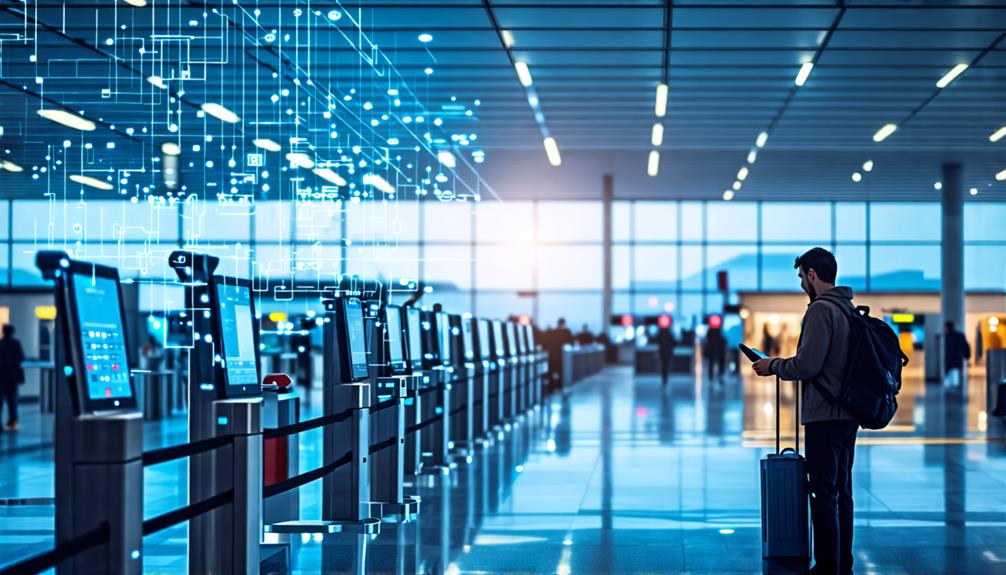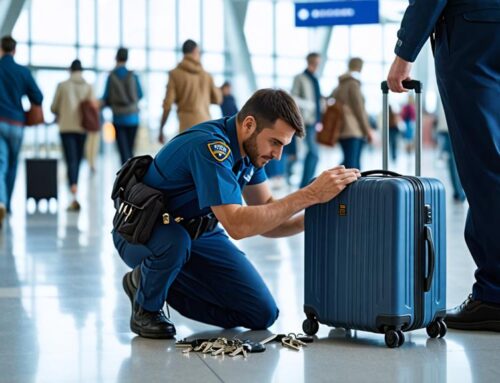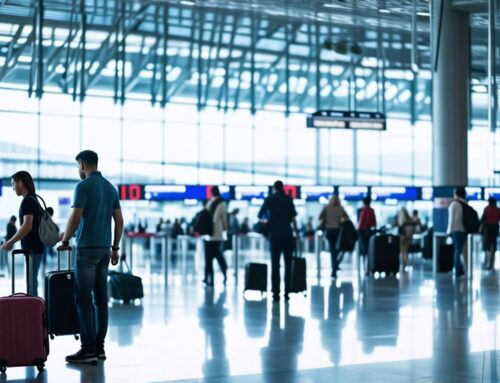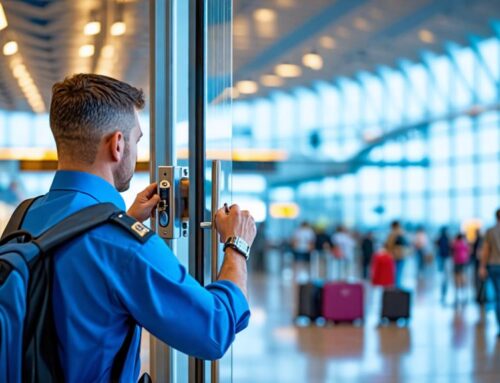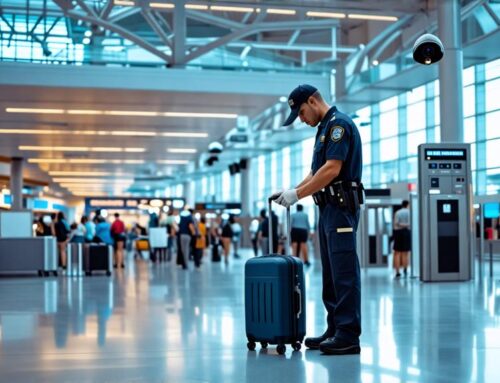Think of locksmiths as the unsung heroes of airport security, much like the silent guardians in a tale of espionage. You might not see them bustling about, but these professionals guarantee every lock, key, and access point functions flawlessly. They’re the ones who implement sophisticated key management systems and conduct routine checks to prevent unauthorized access. But have you ever considered how they tackle emergencies or adapt to evolving security threats? Understanding their role could change your perception of airport safety, offering insight into the intricate dance between security measures and operational efficiency.
Key Takeaways
- Locksmiths implement sophisticated access control systems for restricted airport zones.
- Routine lock maintenance checks ensure optimal lock function and security in terminals.
- Key management systems prevent unauthorized access by tracking key inventory and permissions.
- Emergency lockout services rapidly address lock failures, minimizing disruptions.
- Upgrading locks with advanced technology enhances security and combats evolving threats.
Role of Locksmiths in Airports
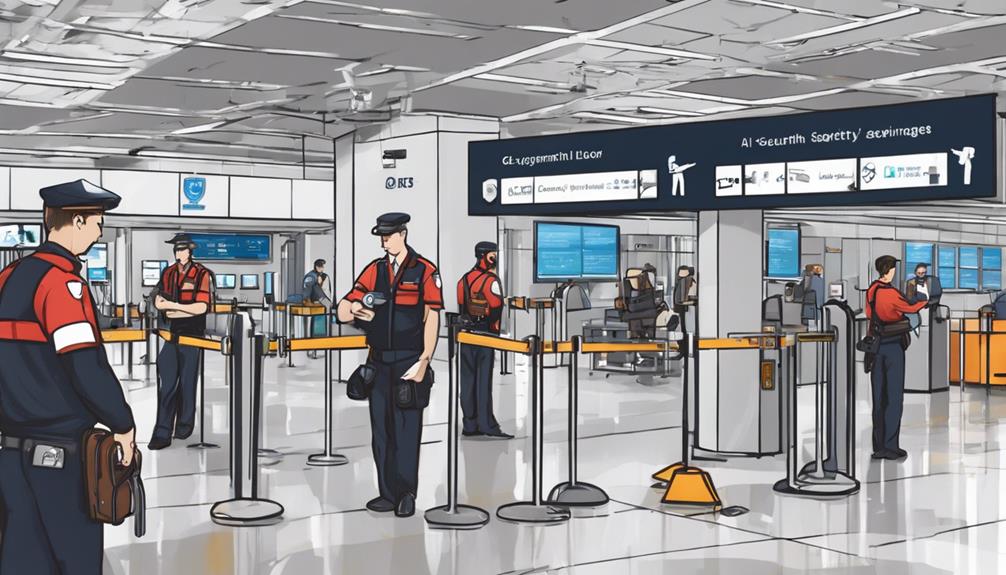
Locksmiths play an important role in maintaining the security framework of airports, guaranteeing that access points and sensitive areas are protected against unauthorized entry. As someone aiming for a position of influence, you understand that controlling access is paramount.
The locksmiths‘ expertise in airport security isn’t just about changing locks or duplicating keys; it’s a strategic endeavor requiring advanced locksmith training. This specialized training equips them with the skills to assess potential vulnerabilities within the airport’s infrastructure.
They address both physical and digital security challenges in these high-traffic areas, guaranteeing a thorough approach to airport safety.
In your quest for power, recognizing risks is critical. Locksmiths constantly evaluate security systems, adapting to emerging threats and guaranteeing that all security measures align with the overall strategic goals of the airport.
They implement sophisticated access control systems, which are crucial in safeguarding restricted zones. Their ability to anticipate and mitigate risks is indispensable, contributing to a secure environment where you can exercise control.
With a robust understanding of airport security, locksmiths function as a strategic asset. Their role extends beyond mere operational tasks; they’re integral to risk assessment and strategic planning.
In positioning yourself as a leader, aligning with these experts can bolster your influence and guarantee a fortified security posture.
Importance of Routine Lock Checks
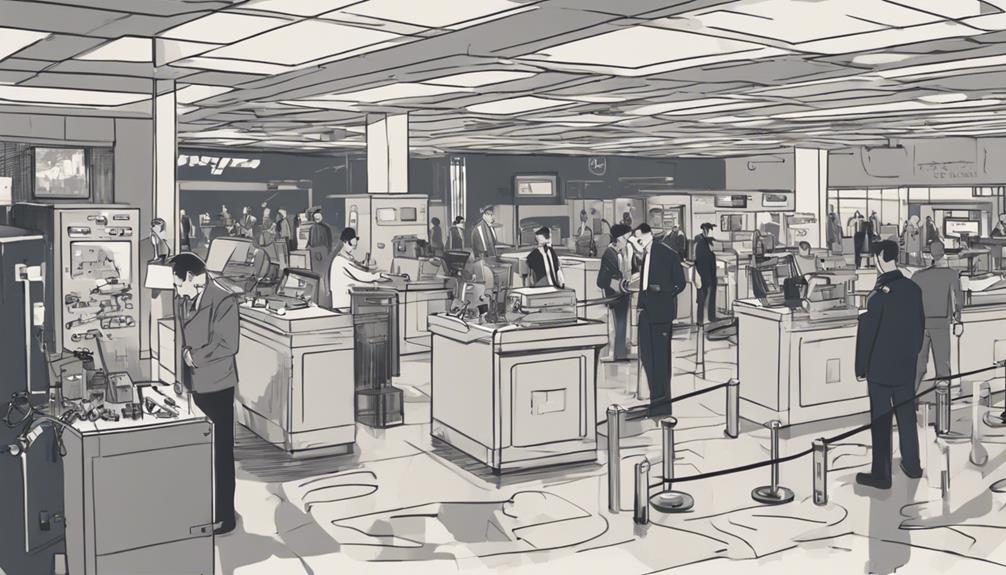
Routine lock checks are a fundamental component of maintaining airport security. Conducting regular inspections guarantees that every lock system operates effectively, minimizing security breaches. You gain control by identifying weaknesses before they become threats.
Locksmiths play an essential role by performing these routine inspections, evaluating lock integrity, and guaranteeing each mechanism is functioning at its best. They’re also involved in securing luggage areas, which is a crucial aspect of preventing unauthorized access to travelers’ belongings.
Additionally, locksmiths manage access to restricted zones, further safeguarding sensitive areas within the airport. They provide the expertise you need to secure sensitive areas, protecting both personnel and assets.
Incorporating thorough security audits into your airport’s strategic plan enhances your power over potential vulnerabilities. These audits allow you to analyze the effectiveness of existing lock systems and make informed decisions about necessary upgrades or repairs.
Key Management Systems
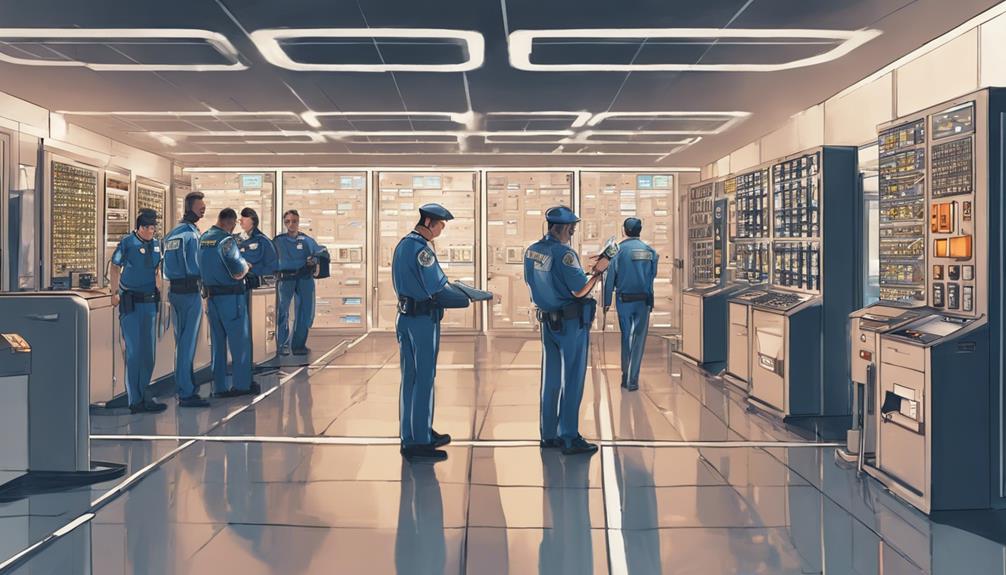
Effective key management systems are vital for maintaining robust airport security. As you oversee complex operations, the ability to strategically manage and track keys guarantees you prevent unauthorized access and bolster defenses.
Key tracking is a significant component, allowing you to monitor the movement of keys in real-time, reducing risks associated with misplaced or duplicated keys. In addition to key management, emergency lockouts services are important for travelers who may find themselves locked out of vehicles or other areas within the airport. By employing advanced tracking technologies, you can swiftly identify who accessed specific areas, reinforcing accountability among staff and contractors.
Inventory management of keys is equally important. It involves maintaining a precise record of every key within the facility, making certain that each is accounted for and stored securely.
This strategic approach minimizes the potential for security breaches, allowing you to focus on safeguarding sensitive areas without distraction. Implementing a sophisticated key management system not only enhances security protocols but also streamlines operations, saving valuable time and resources.
Securing Restricted Areas
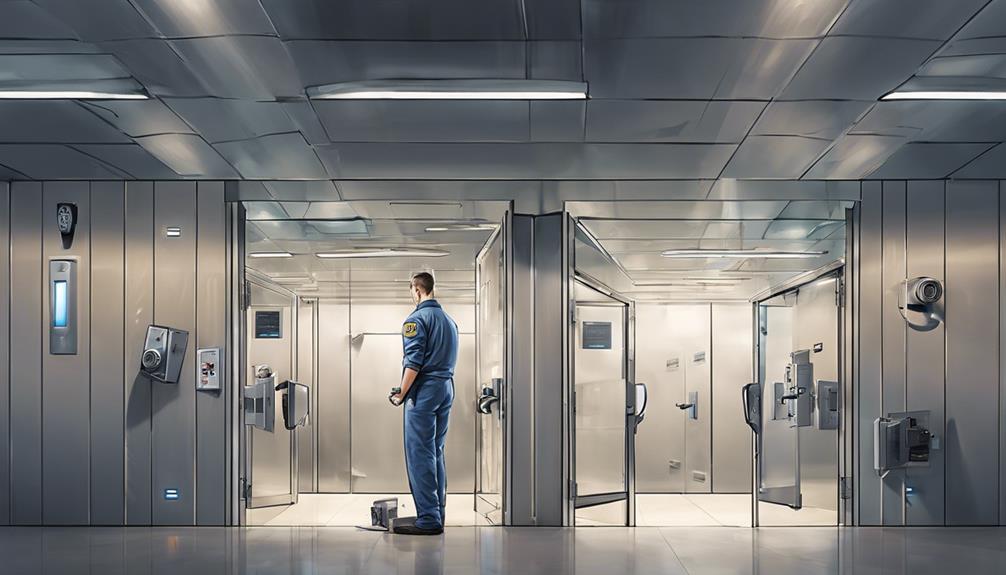
Securing restricted areas remains vital and requires an intricate balance of technology and strategy. As someone responsible for airport security, you understand that controlling access to sensitive zones is essential.
To guarantee restricted access, robust security protocols must be in place, beginning with sophisticated lock systems. Electronic access controls, biometric scanners, and smart locks form the backbone of this approach, allowing only authorized personnel to enter. Locksmiths manage these access control systems by regularly maintaining and updating them to prevent unauthorized entry.
When strategizing security measures, consider potential vulnerabilities. Every lock system, while advanced, requires periodic risk assessment to identify weaknesses. Locksmiths play an important role here, providing expert analysis and upgrading systems as needed. They tailor solutions to meet evolving threats, making sure your facility remains impenetrable.
Strategic planning involves not just technology but also training. Educate your team on the latest security protocols. Empower them to react swiftly to breaches.
Implement regular drills to test response times and reinforce the importance of maintaining restricted access.
Emergency Lockout Solutions
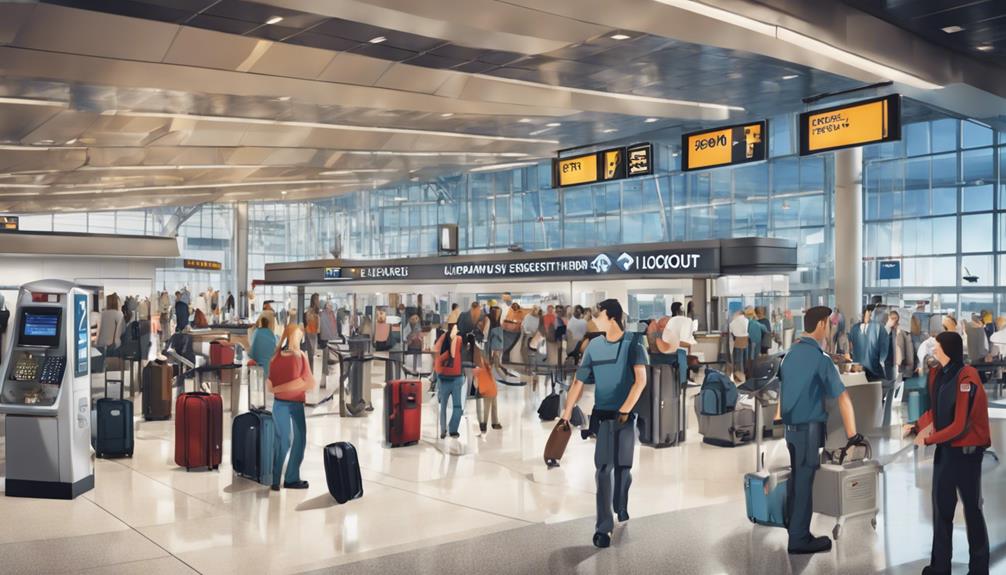
When addressing emergency lockout solutions in airport settings, you must prioritize rapid response services to minimize operational disruptions.
To effectively accomplish this, consider partnering with a dedicated team of professional locksmiths who can provide swift and reliable assistance.
Implementing preventive lock measures can greatly reduce the risk of unauthorized access and potential security breaches.
Rapid Response Services
At any time, a sudden lockout at an airport can create significant security and logistical challenges, demanding immediate and strategic solutions. Such scenarios highlight the importance of essential emergency locksmith services at airports, which are pivotal in maintaining security during critical situations like lockouts or security breaches.
You understand the critical need for rapid response services that guarantee both safety and operational continuity. Mobile locksmith services are indispensable in this situation, offering swift and effective emergency lockout solutions. With their ability to reach any point within the airport swiftly, they mitigate risks of unauthorized access and operational delays.
Conducting thorough airport security audits, they identify vulnerabilities and devise strategies that bolster your security infrastructure. This proactive approach not only addresses immediate lockout issues but also fortifies your facility against future threats.
When choosing locksmith services, prioritize those with a proven track record in airport environments, as they possess the specialized skills and experience required. Strategic planning involves selecting locksmith partners who can seamlessly integrate with your existing security protocols.
Their expertise guarantees that lockouts aren’t just resolved but are strategically prevented from recurring. By leveraging these rapid response services, you maintain control over your airport’s security, guaranteeing smooth operations and safeguarding your assets.
This decisive action empowers you to uphold the highest standards of security in your facilities.
Preventive Lock Measures
Maneuvering the complexities of airport security means you must stay ahead with preventive lock measures that mitigate the risk of emergency lockouts. Airports present unique challenges, such as high-security requirements and handling a large volume of locks and keys, which require locksmiths to be exceptionally vigilant.
Implementing preventive lock audits is vital to identifying vulnerabilities before they escalate into security breaches. Regular audits allow you to assess the integrity of locking systems, ensuring they meet the high standards required for airport facilities. These audits are your first line of defense, enabling you to pinpoint weaknesses and take corrective actions promptly.
Proactive security measures are essential for maintaining seamless airport operations. By anticipating potential lock failures, you can minimize downtime and prevent unauthorized access. This foresight not only strengthens security but also optimizes operational efficiency.
Emphasizing robust lock maintenance schedules and investing in advanced lock technologies are strategic moves that empower you to control access effectively.
In an environment where every second counts, having a thorough emergency lockout strategy is non-negotiable. Develop a plan that includes rapid response teams and state-of-the-art tools to address lockouts swiftly.
Upgrading Security Technology
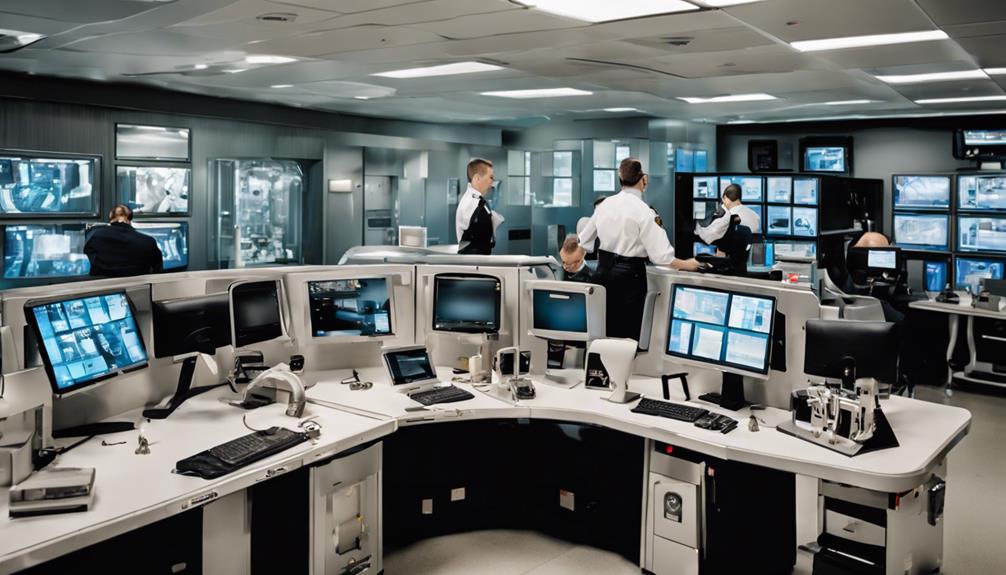
In today’s fast-paced and ever-evolving security landscape, upgrading security technology isn’t just a recommendation—it’s a necessity. As an airport authority, you understand the risks presented by outdated systems. High-security locks, vital for airport security systems, are among the critical components that need to be modernized to guarantee robust protection.
To maintain a formidable security posture, strategic enhancements are significant. Consider these technology upgrades:
- Biometric Authentication: Implement cutting-edge biometric systems for access control. These technologies assure only authorized personnel gain access to sensitive areas, reducing the risk of insider threats.
- Surveillance Integration: Integrate advanced surveillance systems with existing security infrastructure. This seamless integration allows for real-time monitoring and quick response to potential security breaches, enhancing situational awareness.
- Advanced Analytics: Utilize AI-driven analytics to process vast amounts of data quickly. This capability enables your security team to identify patterns and predict potential threats before they materialize, giving you a strategic advantage.
- Cybersecurity Measures: Strengthen cybersecurity protocols to protect against digital threats. As technology evolves, so do cyber threats, making robust cybersecurity an essential component of your overall security strategy.
Lock Repair and Replacement
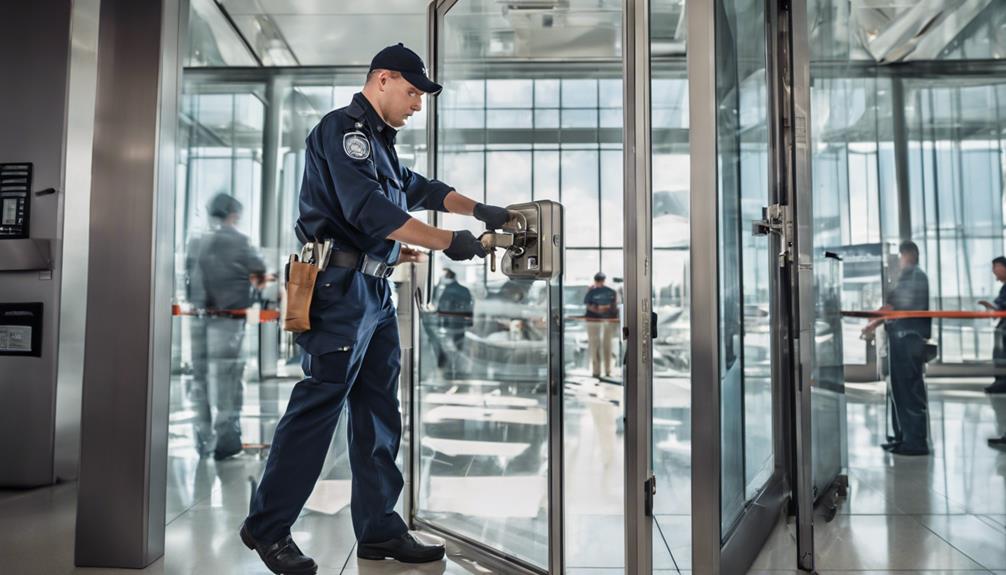
Lock repair and replacement are fundamental components of maintaining airport security. As an airport authority, you need to guarantee that every lock functions at its best. Regular lock maintenance, which includes detailed lock health checks, is imperative to prevent unexpected failures and prolong the lifespan of locks.
By understanding different lock types and installation techniques, you can effectively evaluate risks and implement strategic measures. From mechanical to electronic locks, each type requires specific repair skills and knowledge. Mechanical locks, for example, often involve intricate mechanisms that demand precise handling, while electronic locks may require a thorough understanding of digital systems.
When reviewing your airport’s security, consider the age and condition of your locks. Worn or outdated locks represent vulnerabilities that could be exploited. Replacement not only eliminates these weaknesses but also introduces advanced security solutions.
Choose lock types that align with your facility’s security needs and integrate seamlessly with existing systems.
Furthermore, installation techniques are significant. Improper installation can compromise even the most sophisticated lock, undermining your security strategy. Engage professionals who are adept at evaluating the unique challenges of airport environments and can apply their expertise to secure essential areas effectively.
Access Control Systems
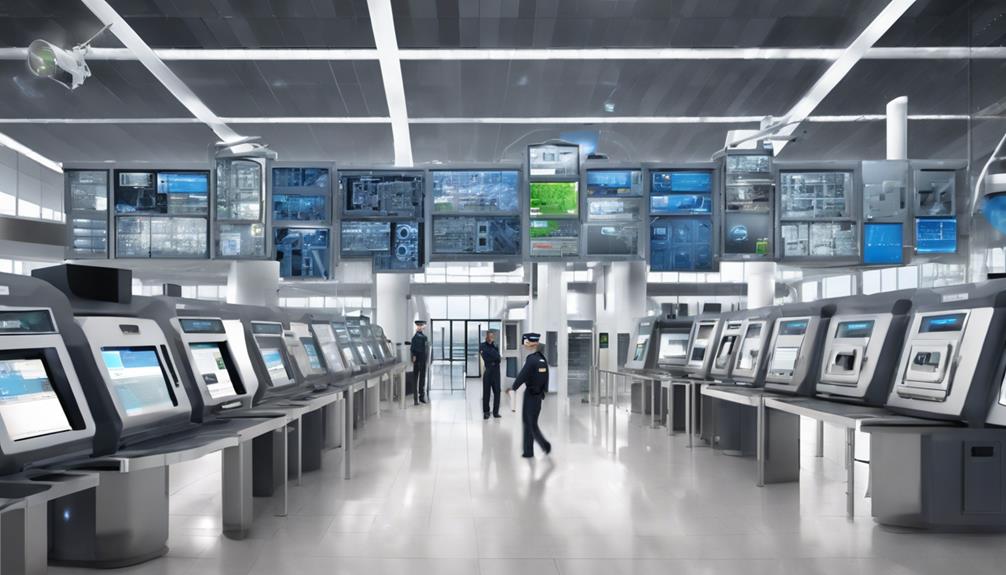
A robust access control system is vital for maintaining the security integrity of any airport facility. As someone who values strategic planning and risk assessment, you know that managing access is essential. Consider these key components:
1. Biometric Authentication: Airports can enhance security by integrating biometric systems, such as fingerprint or retina scans. This not only guarantees accurate identification but also greatly reduces unauthorized access.
Additionally, securing airports requires locksmiths to manage and troubleshoot these complex systems, making certain they function seamlessly.
2. Electronic Locks: Unlike traditional locks, electronic locks provide flexibility and real-time control. You can monitor and modify access permissions instantly, making them indispensable for dynamic environments like airport terminals.
Locksmiths play an important role in maintaining these electronic systems, making certain they remain reliable and secure.
3. Centralized Control: A single, centralized system allows you to manage multiple access points efficiently. This unified approach simplifies oversight and strengthens overall security protocols, making certain that no entry point is left vulnerable.
4. Audit Trails: Maintaining detailed logs of access attempts is vital. These audit trails help you identify potential security breaches and assess risks proactively, allowing for timely intervention and strategic adjustments.
Benefits of Regular Maintenance
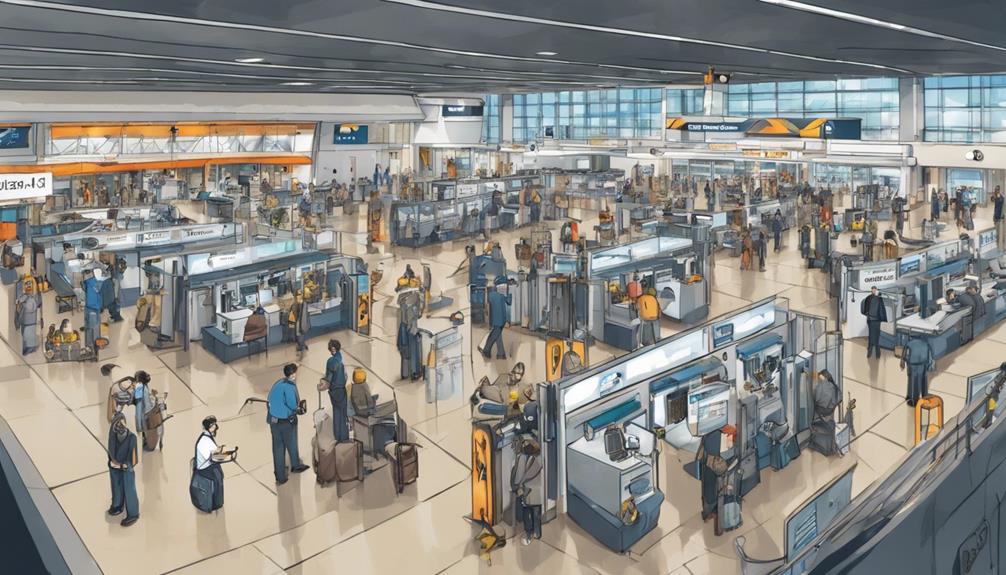
Regular maintenance is essential to ensuring your locks function ideally, reducing the risk of system failures that could compromise airport security.
By scheduling emergency door repair services, facilities can address urgent issues immediately, preventing unauthorized access and mitigating potential security breaches that can disrupt operations.
Additionally, strategic maintenance extends the lifespan of your equipment, maximizing investment and enhancing overall security infrastructure.
Ensuring Optimal Lock Functionality
In the world of security, everything hinges on reliability, and nowhere is this more critical than in guaranteeing ideal lock functionality.
To maintain the highest standards, you must prioritize regular maintenance. Doing so guarantees not only lock durability but also peak lock performance, which are both essential in the high-stakes environment of airport terminals and facilities.
Here’s a strategic approach to guarantee your locks function at their best:
- Routine Inspections: Conduct regular checks to identify wear and tear early. This proactive step mitigates risks and prolongs lock lifespan.
- Professional Servicing: Engage skilled locksmiths who can precisely assess lock mechanisms and provide expert maintenance, guaranteeing that each lock performs flawlessly.
- Technology Upgrades: Stay ahead by integrating the latest advancements in lock technology. This strategic move enhances security and boosts overall lock performance.
- Emergency Response Plans: Develop and implement swift action plans for lock failures. This guarantees minimal disruption and maintains security integrity.
Reliable lock functionality sets the foundation for an effective security system, but preventing unauthorized access requires vigilant and proactive measures. As someone responsible for airport security, you understand that consistent access control is vital. A lapse could lead to serious breaches, affecting passenger safety and operational integrity.
Regular maintenance by professional locksmiths guarantees that all entry points are secure and that access systems are up-to-date with the latest technologies.
Conducting thorough security audits is essential in this situation. These audits assess the current state of access control measures and identify potential vulnerabilities. Locksmiths play a strategic role in these evaluations, pinpointing weaknesses that others might miss. By addressing these issues promptly, you considerably reduce the risk of unauthorized entry, safeguarding both personnel and assets.
Strategic planning is necessary for staying ahead of potential threats. Regularly scheduled maintenance and updates to access control systems signal a proactive stance on security. This not only deters unauthorized individuals but also boosts the confidence of employees and passengers.
You wield the power to decide when and how to enhance security measures, guaranteeing your strategies are as robust as they’re effective. Take charge, and make preventing unauthorized access a priority.
Extending Equipment Lifespan
Effective maintenance practices considerably extend equipment lifespan, a critical factor in maintaining airport security systems.
As a decision-maker, you understand that the durability of your locks plays a pivotal role in safeguarding the airport’s assets. By implementing robust maintenance strategies, you not only enhance lock durability but also optimize operational efficiency and reduce potential vulnerabilities.
Consider these strategic benefits of regular maintenance:
- Enhanced Security: Well-maintained locks prevent unauthorized access, ensuring that only authorized personnel can breach sensitive areas.
- Cost Efficiency: Routine checks and servicing prevent costly replacements, minimizing long-term expenses and maximizing your budget’s potential.
- Operational Continuity: Consistent maintenance means fewer unexpected breakdowns, ensuring that airport facilities run smoothly without interruption.
- Risk Mitigation: Proactive strategies identify potential security threats before they escalate, maintaining a secure environment for passengers and staff.
Low Rate Locksmith Services
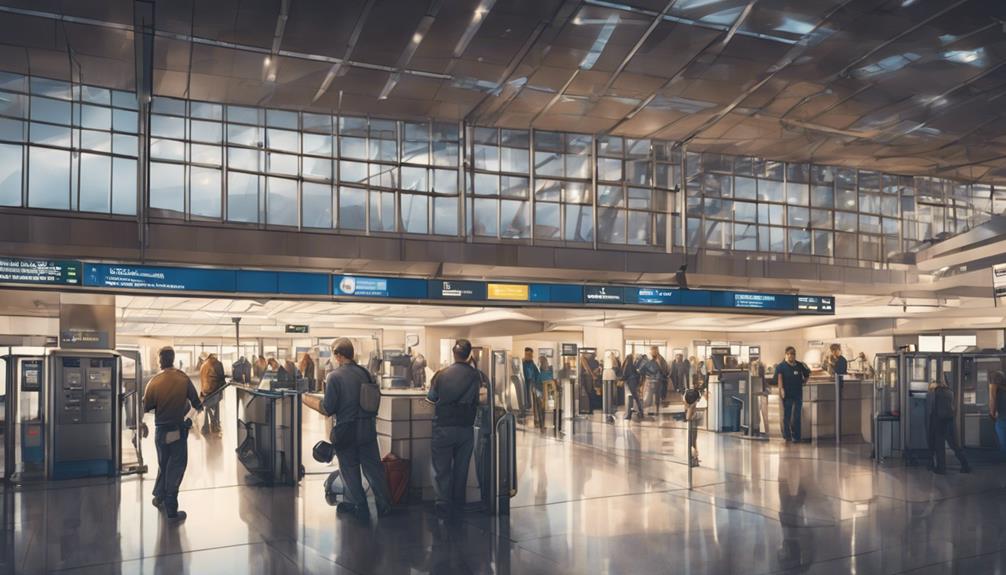
Finding low rate locksmith services without compromising on quality is essential for both individuals and businesses seeking cost-effective security solutions. When you strategically choose budget locksmiths, you’re not just saving money—you’re making a savvy investment in the security infrastructure of your airport terminals and facilities. By focusing on affordable services, you can allocate resources more effectively, ensuring that security doesn’t become an overwhelming expense.
Here’s a quick comparison to guide your decision-making:
| Criteria | High-Cost Locksmiths | Low-Cost Locksmiths |
|---|---|---|
| Service Quality | High | Moderate to High |
| Response Time | Fast | Fast |
| Cost Efficiency | Low | High |
Evaluating these factors, you can see that low-cost locksmiths often deliver comparable quality and rapid response times at a fraction of the cost. This strategic choice allows you to maintain robust security measures without straining your budget.
In an environment where security threats are ever-evolving, appraising and mitigating risks is paramount. Opting for affordable locksmith services empowers you to reallocate funds towards other critical security enhancements like advanced surveillance technologies. Ultimately, strategic planning in selecting locksmith services equips you with a solid foundation for maintaining a powerful, secure airport environment.
Frequently Asked Questions
How Do Locksmiths Ensure the Security of Digital Locks in Airports?
You leverage digital lock technologies to enhance security, aligning with airport security protocols. By conducting expert analysis, evaluating risks, and strategically planning, you guarantee robust protection against breaches, empowering airport operations with cutting-edge solutions and maximum control.
What Qualifications Are Required for Locksmiths to Work in Airport Security?
Imagine a key revealing potential: You need locksmith certifications and deep understanding of airport security regulations. This empowers you to navigate complex systems and strategically plan to mitigate risks, ensuring robust security in high-stakes environments like airports.
How Do Locksmiths Coordinate With Airport Security Personnel During Emergencies?
You coordinate with airport security personnel by swiftly implementing emergency protocols. Engage in strategic planning and security collaboration to assess risks. Your expertise guarantees seamless communication, enhancing the airport’s resilience and maintaining control during critical situations.
You’ve got to guarantee key control through strategic planning. Implement security protocols like restricted keyways and encrypted key systems. Regular audits and risk assessments deter unauthorized duplication, empowering you to maintain authority over access points effectively.
How Often Are Locksmiths Required to Update Their Skills for Airport Security Tasks?
You’ll find locksmiths are required to undergo skill enhancement regularly, typically every one to two years, through rigorous training programs. This guarantees they’re equipped to handle evolving security challenges, providing strategic advantages in risk assessment and planning.
Conclusion
You’ve seen how locksmiths are the unsung heroes of airport security, expertly wielding their tools like maestros conducting a symphony of safety. They relentlessly check locks and manage keys with ninja-like precision, ensuring restricted areas remain impenetrable fortresses. With strategic planning and risk assessment, they seamlessly integrate cutting-edge access control systems, transforming airports into bastions of security. They’re not just locksmiths; they’re the guardians against chaos, tirelessly working to protect passengers and operations from the shadows.
Airports We Service:
Washington, D.C. (IAD)
Washington, D.C. (DCA)

